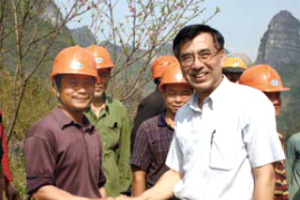Recently, Dr. Thomas Chan Sze Tong, former chief executive officer of World Vision China and Hong Kong, shared of World Vision China’s past developments, present challenges, and future goals through the October’s issue of the ministry’s monthly periodical.
In 1996, Chan left his successful medical career as a pediatric neurosurgeon in Hong Kong to serve underprivileged children through World Vision Hong Kong and China. In his last ten years of service, he pioneered China with the value of strengthening the will before alleviating poverty, assisting millions of people and allowed them stand up firmly.
Greatest Development: Affirmation by Chinese Government
During this past 14 years of serving in World Vision China, the most important development is receiving the affirmation and support of the Chinese central government, he said. With the trust of the government, their ministry’s development scale and reputation increased overnight; this positively benefitted their “two-legged work” - disaster relief and community development.
It wasn’t an easy process, stated Chan. In the early 80s, the disaster relief efforts in China hasn’t been widely recognized and accepted, and there were minimal cooperation between the Chinese government and non-governmental organizations; it required facilitation and cooperation in various aspects to establish a mutual trust.
For example, the ministry’s work in China was mainly focused on poverty alleviation, but the government thought their work was focused on children. Because of this, the ministry had to make the corresponding adjustments to focus on children sponsorships. However, such adjustments brought establishment of many children-related work, and the source of funding naturally were focused on children.
Existing Challenges: New Projects, Shortage in Funding and Staffs
The first thing that he thinks of in poverty alleviation is the rural villages, he said, but as many places are becoming urbanized, poverty problems are beginning to appear in cities as well. In response, the ministry has actively tested projects such as “micro-loans”, yet with the majority of funding received for sponsoring of underprivileged children, such kind of long-term investment is no doubt a difficult problem.
Moreover, the shortage of staffs, in particular, the front line workers is another difficult problem; as new projects have been given birth the personnel is very lacking, he said.
Future Challenges: Pioneering by Meeting Needs and Taking Precautions
In conclusion, the former chief executive said that the development of World Vision’s China in the future will be impacted in various ways – international relations, mainland development, and participation of average citizens; however, the most they can do is to take precautions and actively build relationship and trust with government in the disaster zone and local authorities. Meanwhile, as the cities become urbanized, the ministry must closely monitor the needs for new services and make the appropriate responses.
After having served for 14 years at the leadership capacity, Chan will return to his medical practice, invest more time on fulfilling the spiritual needs, and continue to care for the ministry’s work by becoming his coworkers support, maintain weekly contact with the China office, and participate in other relevant activities.
Dr. Thomas Chan Sze-Tong joined Queen Elizabeth Hospital in 1978 and began his specialist service as a pediatric neurosurgeon. Over the course of a long and varied medical career, he has used his expertise in the care of children at Queen Elizabeth Hospital and also in the United Kingdom. Since 1996, he has worked steadfastly in the care and relief of the less fortunate and the most vulnerable in China, winning the respect of people in Hong Kong and around the world. He was appointed Justice of Peace by the Hong Kong SAR Government in 2001. Last year, he was conferred the degree of Doctor of Social Sciences honoris causa by the University of Hong Kong.
[Editor's note: Dan Li contributed to this report.]




















